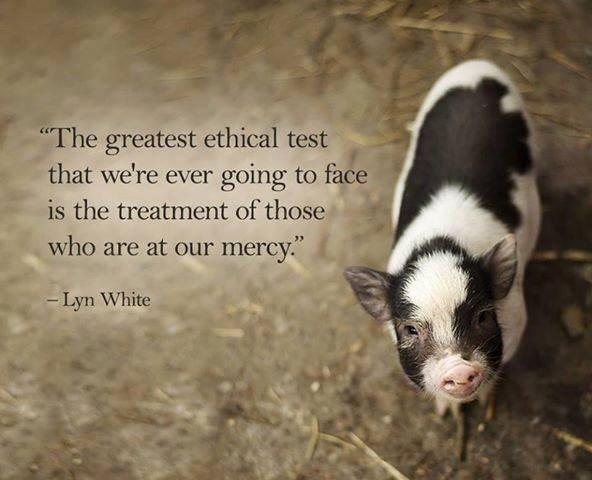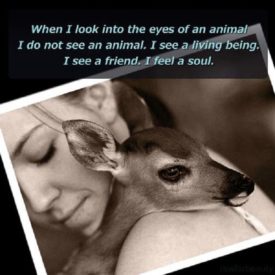When we speak about caring for animals, we’re really referring to non-human animals. Because people are animals too. And because non-human animals we “keep” (aka domesticated animals) can be so much like us and yet not us, they are the most prevalent victims of the many forms of intentional and unintentional harm of which humans are capable.
We’ve been conditioned over the course of generations to believe that animals are unworthy of our serious consideration for their welfare. This belief leads us to continue justifying our long-held habits of severely exploiting sentient creatures and traps us into viewing ourselves as necessary agents of that harm. Stepping outside of our convenient and familiar domination relationship with animals into a respectful, co-inhabitant relationship requires us to openly embrace an alternative reality that extends our compassion and respect to animals.
But our relationship with animals is complicated. Many of us feel that we love animals and we abhor cruelty to animals. We may go to great effort and expense to give our animals what we think they want and need and we can form strong bonds with the animals we keep. But most of us experience a loss of that compassion when it comes to animals that we keep, or more likely someone else keeps for us, to be used for food, experimentation, and other economic profit.
“Humans account for about 36 percent of the biomass of all mammals. Domesticated livestock, mostly cows and pigs, account for 60 percent, and wild mammals for only 4 percent.”
Humans and Big Ag Livestock Now Account for 96 Percent of Mammal Biomass

5 Habits to limit harm to animals we keep
1. Change the way we think about animals
- Be willing to think critically and honestly about the animals we use.
- Consider the language we use that prevents us from thinking of “meat” or “leather”, … as coming from sentient creatures.
- Think about where the animals we use come from, what conditions do they suffer, how do our choices contribute to those conditions?
- Consider the way we judge harshly other societies who, for example, raise and eat dogs, when we ourselves simply use different animals in the same way. What causes us to think so differently about our own harmful use of animals? Habit? Conditioning?
- Think about (visualize) what we could do differently to reduce our role in the harm.
2. honor the animals we use
We so easily demean and disregard animals. To counter that we can take time to recognize the lives sacrificed for us and the misery borne for our purposes. If that service does not cost their lives, consider where these animals will go once we are finished with them? Offer a prayer if that is helpful (It’s a practice that has been used by generations of people before us.) Or simply take a silent moment to fully, respectfully consider the lives of the animals we use.
3. Adopt practices that don’t Require Animal Use
The most powerful way we can limit harm to animals is to avoid our common use of them and the need to breed them.
A plant-based diet removes the need to keep and breed animals to feed ourselves. A shift among the human population towards a plant-based diet would diminish or remove the practice of one of the greatest horrors our time has seen, that of factory farming (aka industrial farming) while also removing one of the most significant factors contributing to environmental degradation.
- What is a plant-based diet and why should you try it? – Harvard Health
- Beginner’s Guide to a Plant-Based Diet | Forks Over Knives
- Vegucated – (Full Movie Documentary) (Engaging and entertaining!)
Plant-based alternatives to animal skins and furs:
- These Leather Alternatives Are Changing The Future Of Sustainable Fashion
- Cruelty-free Fashion — The Considerate Consumer
- Fur alternatives — Collective Fashion Justice
Alternatives to keeping pets might include pet sitting, volunteering at a pet shelter, or fostering pets. If you do choose to keep a pet, consider keeping a rescued animal and be an example of responsible pet ownership.
- Craving a Pet | Psychology Today | Jessica Pierce, Ph.D.
- The Annual Cost Of Pet Ownership: Can You Afford A Pet?
- Guidelines for Responsible Pet Ownership | AVMA
Entertainment activities that don’t use captive animals:
Get to know and love cruelty-free products:
- Leaping Bunny – Cruelty Free Products Search
- Cruelty-Free Brands List (2021) ⎯ includes 500+ cruelty-free brands!
4. Become a voice for animals
- Keep a list of help contact numbers: animal control, emergency veterinary hospitals, outreach rescue organizations.
- What To Do When You Witness Animal Cruelty – Animal Legal Defense Fund
- Become acquainted with the law: Virginia Code for Animal Care
- Updating Animal Welfare Thinking: Moving beyond the “Five Freedoms” towards “A Life Worth Living”
- Become a “local expert” on responsible care and welfare of companion animals; equine and companion livestock; agricultural animals; or lab animals.
- Participate in regional social media groups that address animal welfare issues.
Note: While many people who keep animals do so in a way that tragically imperils the animals, our laws still view animals as personal “property.” For this reason, it’s difficult to remove an animal for its own protection. And however misguided animal owners may be, a practice of compassion includes compassion for the people who keep animals as well as for the animals themselves. Animal rescuers and animal control officers who are knowledgeable about the laws and acceptable practices for helping animals continue to navigate this challenge as our society strives to evolve social practices that respect animals and people.
Animal assistance organizations in the Central VA region….
5. Talk about what you’re learning with others
Most importantly, we can overcome the hesitation to CARE about all animals openly and to share that compassion with others in our circle. Our habits of harm to animals will only evolve towards compassion when we are able to consider it honestly, speak about it freely, and spread habits of compassion.
More ideas or questions about how we can avoid doing harm to animals? Join our Facebook group and share them.

“If I can inspire people to help be a champion of healing, hope, and justice then I’ve done my job.”
Father Frank Mann’s Awakening to Compassion for Animals (video)